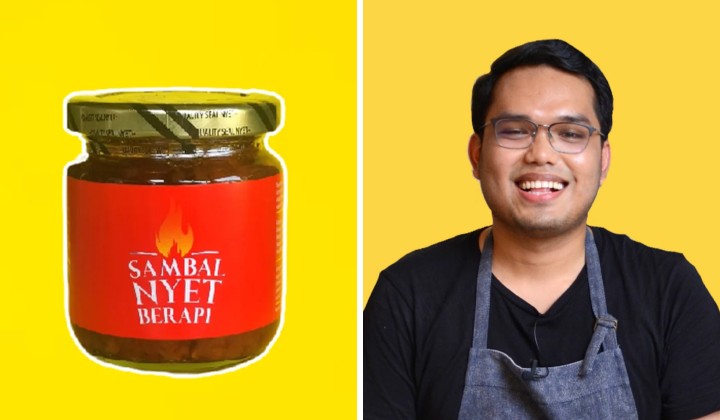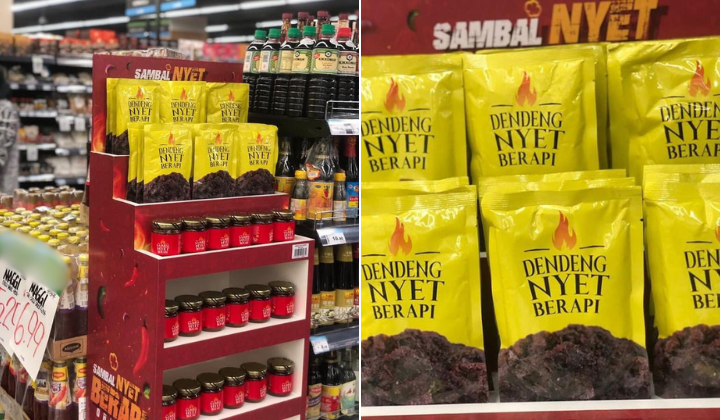Spicy Legal Action: Khairul Aming Cracks Down On Copycat Sambal Nyet
Through a social media post, Khairul Aming announced that his lawyer had sent eight demands to the imitators.

Subscribe to our FREE Newsletter, or Telegram and WhatsApp channels for the latest stories and updates.
Khairul Aming, the social media influencer and entrepreneur famed for his culinary ventures, is not taking the imitation of his sambal products lying down.
In a world where competition is fierce, Khairul stands firm in protecting the integrity of his brand.
He acknowledged that he knew of a product called Sambal Nyet Khairi, which had attempted to plagiarize or imitate his own Sambal Nyet Berapi.
Many customers were deceived, thinking it was the original Sambal Nyet.
We stand with you KA! My house now harus ada Sambal Nyet cause my dad loves it so much. You can see his satisfaction of eating kalau ada Sambal Nyet!
— Lady N (@nadiamanan) December 29, 2023
Khairul said his team are gathering evidence and has purchased the sambal to serve as evidence and to trace who the seller is.
He pointed out that the sauce is identical, and his team knows who the seller is.
His lawyer has sent a letter of demand (LOD) concerning infringing intellectual property rights.
Highlighting that the Sambal Nyet trademark was officially registered and approved on November 2, 2021, Khairul emphasized that the imitators would be held accountable if they failed to comply with the eight demands he had outlined.
READ MORE: Khairul Aming’s Famous Sambal Nyet Has A Copycat?
Despite consistent support for small traders, Khairul said this is not the right way to conduct business.
He further stated that this was not a first-time incident; his sambal had also been plagiarized a few years ago.
At the time, the imitator had come forward to offer an apology.
Local Innovations: Navigating the Imitation Conundrum in Malaysia
In Malaysia, the issue of imitator brands is not uncommon.
One example is Asadi, a well-known local Malaysian brand specialising in footwear, particularly sandals and shoes suitable for the tropical climate.
It is important to note that Asadi is not officially reported as a copy or imitation of Adidas.
Any resemblance in brand name phonetics or product design between Asadi and Adidas could be coincidental or a marketing strategy to appeal to a certain demographic, but this does not necessarily constitute copying or imitation in a legal sense.
Sambal nyet tu dah daftar hak milik. Kalau nak sembang adidas jadi asadi. Mmg nama lain, ni kau guna sambal nyet jugak. Tukarla sambal nyot ke apa. Benda member baru berjaya dalam local punya market. Kau nak compare dgn adidas panasonic yang dah worldwide known https://t.co/LhmxcATm8u
— Ziqqq (@ziqrisss) December 29, 2023
Another example is CFC, which stands for “Crispy Fried Chicken,” a fast-food chain based primarily in East Malaysia that offers a similar product to the global giant KFC (Kentucky Fried Chicken).
CFC has tailored its menu to suit local tastes with various spices and flavours that resonate with Malaysian consumers.
While it may draw inspiration from international fried chicken franchises, CFC distinguishes itself by integrating local culinary preferences.
Global Brand Imitations: The Complexities of Brand Identity
Indeed, the phenomenon of brands imitating others is not unique to Malaysia and occurs at a global level as well.
A notable example is Miniso, a Chinese retailer often compared to Uniqlo, a Japanese fashion retail company known for its design and branding.
Miniso has faced criticism for its similar store layout, product design, and branding that evoke the aesthetic of Uniqlo.
This strategy may have been employed to capitalize on the global reputation of Japanese brands for quality and reliability.
The company faced a backlash from Chinese consumers, leading to Miniso apologising for any confusion caused by their branding.
This controversy highlights the complex nature of brand identity in the global market and the sensitivity around the origins and authenticity of brands.
Share your thoughts with us via TRP’s Facebook, Twitter, Instagram, or Threads.





